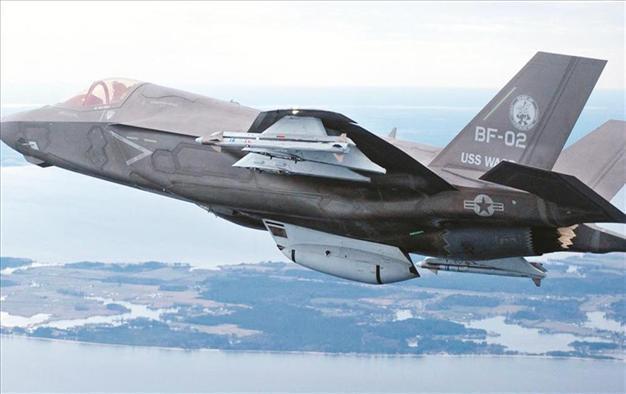Lockheed dispute clouds Turkey’s F-35 commitment
Burak Bekdil ANKARA - Hürriyet Daily News

A number of countries, including Canada, Australia and Britain, have also threatened to postpone orders for the new F-35 due to numerous delays. REUTERS photo
Turkey has been one of the keenest partners in the multinational Joint Strike Fighter (JSF) consortium, but major disputes with the leading manufacturer in this huge program have weakened Turkish enthusiasm.Last month, Turkey’s defense procurement authorities announced they were postponing an order to purchase the country’s first two F-35 fighter jets to be built by the JSF partnership. They cited “rising costs and technological failures” for their decision.
“Due to the current state of the JSF... and the rising cost ... it was decided to postpone the order placed on Jan. 5, 2012, for the two aircraft,” the undersecretariat for Defense Industries (SSM) said. It was also said that the decision was taken because the technical capabilities of the aircraft were “not at the desired level yet.” But Turkey still intended to buy 100 more F-35s in the long run.
Privately, procurement officials admit there was a “certain degree of psychological deliberation at work too.” By that they meant a “bandwagon effect,” which had added Turkey to a list of skeptical partners.
An SSM official said that it would be safer for Turkey to join the skeptical partners in order not to “stand alone in the dark.”
In December, JSF partner Canada threatened to reconsider its purchase of the F-35. Shortly after that, Australia followed, saying that it would buy 24 Boeing-F/A 18 Super Hornets if it saw any more delays in the JSF program. European partners Britain and the Netherlands are considering delays in their orders and questioning rising costs. Also, Italy reduced its JSF order by 30 percent last year as part of a broader reduction in government spending.
But Lockheed Martin F-35 program vice-president Steve O’Bryan said last week: “We will continue to drop the price of the airplane out to approximately 2020 where the U.S. government estimate is for an airplane, with the engine and all mission equipment, to be approximately $67 million. That is better than any fourth generation fighter out there today in terms of cost.”
That’s relieving but, for Ankara only if put into a formal guarantee. Recently, the SSM requested “cost guarantees” from the JSF consortium. “We don’t’ want to walk in complete darkness in regards to our budgeting,” said one SSM official. “We want to clearly see what kind of costs would be ahead of us.”
Industry sources said it would be surprising if the JSF group at this stage committed itself to any price when there are several unknowns in the program. “It’s not only Turkey. Other partners are also wary of fluctuations in [cost] estimates and a general cost trend upwards,” said one source. “But I am not sure if Lockheed Martin can commit itself to any set price.”
One concern for the future of the ambitious program is that any reduction in number will make individual planes more expensive, because Lockheed will be unable to spread development and other costs as widely. The average cost per plane has doubled since Lockheed won the development contract in 2001. Since then, the United States has cut its total order by 400 planes.
Lockheed says it still expects to sell about 3,000 of the fighters over the next 25 years, including 2,443 to the U.S.
Turkey, which has spent nearly $1 billion for the future fighter, is not considering an altogether withdrawal at this stage. But costs are not the only snag.
In another contentious issue, Turkey demands to obtain software source codes which the U.S. has been reluctant to share. Turkey announced in March 2011 that it was placing its order for 100 jets on hold due to the ongoing source code refusal issue. Ankara said the negotiations for access to the F-35 source codes, including codes that can be used to control the aircraft remotely had not yielded satisfactory results and that under these conditions Turkey could not accept the aircraft.
“We have not inched forward for the solution of this problem,” the SSM official said. “We don’t know what else we could do to tell our [American] counterparts that access to source codes is essential for us.”
The Air Force headquarters looks impatient about delays. An Air Force officer said that further delays could disrupt operational requirements and planning at the headquarters. “In that case we may have to sit down with the procurement people and devise a stop-gap plan,” he said.
SSM officials ruled out a potential Eurofighter Typhoon order, but say Ankara could consider an F-16 purchase. “We can compensate for rising costs with larger work share for our domestic industry. We also think that technical failures are not failures but just delays. If things get worse we can consider an F-16 buy,” he said.
Turkey is one of nine countries that are part of a U.S.-led consortium to build the F-35 fighter. The others are Britain, Canada, Italy, the Netherlands, Australia, Norway and Denmark.
F-35 orders from Pentagon
ReutersU.S. Air Force 1,763 F-35As
U.S. Navy 260 F-35Cs
U.S. Marine Corps 340 F-35Bs; 80 F-35Cs
Britain 138 F-35Bs
Turkey 100 F-35As
Australia 100 F-35As
Italy 60 F-35As; 30 F-35Bs
Netherlands 85 F-35As
Canada 65 F-35As
Norway 52 F-35As
Japan 42 F-35As
Denmark 30 F-35As
Israel 19 F-35As
















